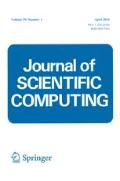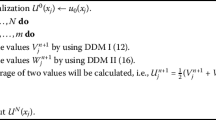Abstract
By combining the two-grid discretization with the partition of unity method, a parallel iterative finite element method for the linear elliptic equations is proposed and investigated. Since the construction of the partition of unity is based on the coarse mesh triangulation, the computational domain of each subproblem can be divided automatically and the number of subproblems can be arbitrarily huge as the coarse mesh parameter H tends to zero. That means our method can be easily implemented in high performance supercomputers or cluster of workstations. Theoretical results based on a priori error estimation of the scheme are obtained, which indicate that our method can reach the optimal convergence orders within a few two-grid iterations. Numerical results are reported to assess the theoretical results.







Similar content being viewed by others
References
Adams, R.A.: Sobolev Spaces. Academic Press, New York (1975)
Babus̆ka, I., Melenk, J.: The partition of unity method. Int. J. Numer. Math. Eng. 40(1997), 727–758 (1997)
Bacuta, C., Chen, J., Huang, Y., et al.: Partition of unity method on nonmatching grids for the Stokes problem. J. Numer. Math. 13, 157–169 (2005)
Chan, T., Mathew, T.: Domain decomposition algorithms. Acta Numerica 3, 61–143 (1994)
Du, G., Zuo, L.: A parallel partition of unity method for the nonstationary Navier–Stokes equations. Int. J. Numer. Method H 27, 1675–1686 (2017)
Du, G., Zuo, L.: Local and parallel finite element method for the mixed Navier–Stokes/Darcy model with Beavers–Joseph interface conditions. Acta Math. Sci. 37, 1331–1347 (2017)
Du, G., Zuo, L.: Local and parallel finite element post-processing scheme for the Stokes problem. Comput. Math. Appl. 73, 129–140 (2017)
Du, G., Zuo, L.: A parallel partition of unity scheme based on two-grid discretizations for the Navier–Stokes Problem. J. Sci. Comput. 75, 1445–1462 (2018)
Du, G., Zuo, L.: A two-grid parallel partition of unity finite element scheme. Numer. Algorithms 80, 429–445 (2019)
He, Y., Mei, L., Shang, Y., Cui, J.: Newton iterative parallel finite element algorithm for the steady Navier–Stokes equations. J. Sci. Comput. 44, 92–106 (2010)
He, Y., Xu, J., Zhou, A.: Local and parallel finite element algorithms for the Navier–Stokes problem. J. Comput. Math. 24, 227–238 (2006)
He, Y., Xu, J., Zhou, A., Li, J.: Local and parallel finite element algorithms for the Stokes problem. Numer. Math. 109, 415–434 (2008)
Holst, M.: Adaptive numerical treatment of elliptic systems on manifolds. Adv. Comput. Math. 15, 139–191 (2001)
Hou, Y., Li, K.: Tangent space correction method for the Galerkin approximation based on two-grid finite element. Appl. Math. Comput. 175, 413–429 (2006)
Hou, Y., Li, K.: Post-processing Fourier Galerkin method for the Navier–Stokes equations. SIAM J. Numer. Anal. 47, 1909–1922 (2009)
Hou, Y., Du, G.: An expandable local and parallel two-grid finite element scheme. Comput. Math. Appl. 71, 2541–2556 (2016)
Larson, M.G., Malqvist, A.: Adaptive variational multi-scale methods based on a posteriori error estimation: energy norm estimates for elliptic problems. Comput. Methods Appl. Mech. Eng. 196, 2313–2324 (2007)
Larson, M.G., Malqvist, A.: An adaptive variational multi-scale method for convection-diffusion problems. Commun. Numer. Methods Eng. 25, 65–79 (2009)
Liu, Q., Hou, Y.: Local and parallel finite element algorithms for the time-dependent convection diffusion equations. Appl. Math. Mech. Engl. Ed. 30, 787–794 (2009)
Li, K., Hou, Y.: An AIM and one-step Newton method for the Navier–Stokes equations. Comput. Methods Appl. Mech. Eng. 190, 6141–6155 (2001)
Liu, Q., Hou, Y.: A post-processing mixed finite element method for Navier–Stokes equations. Int. J. Comput. Fluid. Dyn. 23, 461–475 (2009)
Melenk, J., Babus̆ka, I.: The partition of unity finite element method: basic theory and applications. Comput. Methods Appl. Mech. Eng. 139, 289–314 (1996)
Shang, Y.: A parallel finite element algorithm for simulation of the generalized Stokes problem. Bull. Korean. Math. Soc. 53, 853–874 (2016)
Shang, Y., He, Y.: Parallel iterative finite element algorithms based on full domain partition for the stationary Navier–Stokes equations. Appl. Numer. Math. 60, 719–737 (2010)
Shang, Y., Wang, K.: Local and parallel finite element algorithms based on two-grid discretizations for the transient Stokes equations. Numer. Algorithms 54, 195–218 (2010)
Song, L., Hou, Y., Zheng, H.: Adaptive local postprocessing finite element method for the Navier–Stokes equations. J. Sci. Comput. 55, 255–267 (2013)
Xu, J., Zhou, A.: Local and parallel finite element algorithms based on two-grid discretizations. Math. Comput. 69, 881–909 (2000)
Xu, J., Zhou, A.: Local and parallel finite element algorithms based on two-grid discretizations for nonlinear problems. Adv. Comput. Math. 14, 293–327 (2001)
Zheng, H., Song, L., Hou, Y., Zhang, Y.: The partition of unity parallel finite element algorithm. Adv. Comput. Math. 41, 937–951 (2014)
Zheng, H., Yu, J., Shi, F.: Local and parallel finite element method based on the partition of unity for incompressible flow. J. Sci. Comput. 65, 512–532 (2015)
Zuo, L., Du, G.: A parallel two-grid linearized method for the coupled Navier–Stokes–Darcy problem. Numer. Algorithms 77, 151–165 (2018)
Hecht, F.: New development in FreeFem++. J. Numer. Math. 20, 251–265 (2012)
Author information
Authors and Affiliations
Corresponding author
Additional information
Publisher's Note
Springer Nature remains neutral with regard to jurisdictional claims in published maps and institutional affiliations.
Subsidized by NSFC (Grant No. 11701343) and partially supported by NSFC (Grant No. 11801332),
Subsidized by the Provincial Natural Science Foundation of Shandong (Grant No. ZR2017BA027)
Rights and permissions
About this article
Cite this article
Du, G., Zuo, L. A Parallel Iterative Finite Element Method for the Linear Elliptic Equations. J Sci Comput 85, 35 (2020). https://doi.org/10.1007/s10915-020-01348-0
Received:
Revised:
Accepted:
Published:
DOI: https://doi.org/10.1007/s10915-020-01348-0



